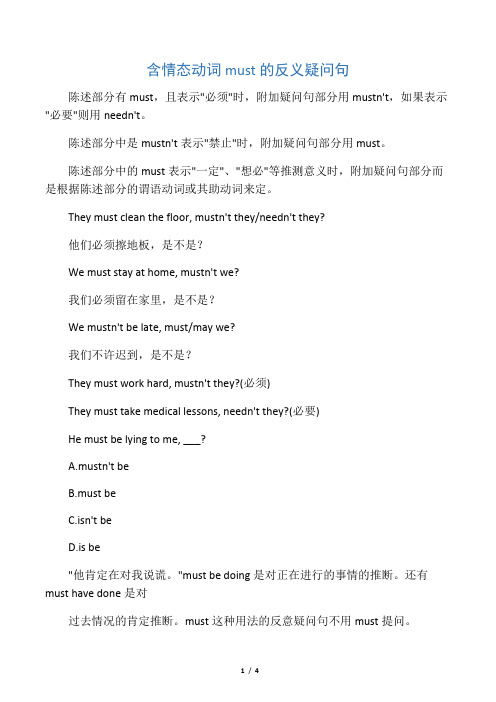情态动词的反义疑问句共20页
含情态动词must的反义疑问句

含情态动词must 的反义疑问句陈述部分有must,且表示”必须”时,附加疑问句部分用must n't,如果表示"必要"则用needn't。
陈述部分中是mustn't 表示"禁止"时,附加疑问句部分用must。
陈述部分中的must 表示"一定"、"想必"等推测意义时,附加疑问句部分而是根据陈述部分的谓语动词或其助动词来定。
They must clean the floor, mustn't they/needn't they?他们必须擦地板,是不是?We must stay at home, mustn't we?我们必须留在家里,是不是?We mustn't be late, must/may we?我们不许迟到,是不是?They must work hard, must n't they ?(必须)They must take medical less ons, n eed n't they?必要)He must be lying to me, ___?A. mustn't beB. must beC. isn't beD. is be"他肯定在对我说谎。
"must be doing 是对正在进行的事情的推断。
还有must have done 是对过去情况的肯定推断。
must这种用法的反意疑问句不用must提问。
推断用法:He must be lying to me.xx 用法:He is lying to me.xx 用法反意疑问句:He is lying to me, isn't he? 推断用法反意疑问句:He must be lying to me, isn't he? 推断用法:He must have been abroad.xx 用法:He has been abroad.xx 用法反意疑问句:He has been abroad, hasn't he? 推断用法反意疑问句:He must have been abroad, hasn't he? 推断用法:He must have gone swimming yesterday.xx 用法:He went swimming yesterday.xx 用法反意疑问句:He went swimming yesterday, didn't he? 推断用法反意疑问句:He must have gone swimming yesterday, didn't he?He must be a visitor, isn't he?(对现在情况的推测)You must have see n him at his birthday party yesterday, did n't you?对过去情况的推测,且句中有过去的时间状语)You must have seen him at his birthday party,haven't you?强调动作的完成)1 带have to时,附加疑问用do或have的相应形式,用do更常见。
反义疑问句详解(情态动词反义疑问句全解)

第五章 第三节
走向高考 ·高考一轮总复习 ·人教版 ·化学
Let's go and listen to the music, shall we? Let us wait for you in the reading-room, will you ?
第五章 第三节
eg:He used to live in London,usedn't /didn't he?
第五章 第三节
走向高考 ·高考一轮总复习 ·人教版 ·化学
陈述部分有had better + v. 疑问句部分用hadn't you?
eg:You'd better read it by yourself, hadn't you?
eg: ①He has to get up at four tomorrow,dosen't he? ②They had to leave early,didn't they
第五章 第三节
走向高考 ·高考一轮总复习 ·人教版 ·化学
陈述部分的谓语是used to 时, 疑问部分用didn't +主语或 usedn't +主语
若陈述句中不包含助动词或情态动词时要用相应的dodoesdid构成的反义疑问句前后时态要保持一致workheredonillyesterdaywasnyoudidngodidyou
走向高考 ·高考一轮总复习 ·人教版 ·化学
高三英语总复习英语备课 组
反义疑问句详解 (情态动词反义疑问句全解)
---Myra
当dare, need 为实义动词 时,疑问部分用助动词 do + 主语
含情态动词must的反义疑问句

含情态动词must的反义疑问句陈述部分有must,且表示"必须"时,附加疑问句部分用mustn't,如果表示"必要"则用needn't。
陈述部分中是mustn't表示"禁止"时,附加疑问句部分用must。
陈述部分中的must表示"一定"、"想必"等推测意义时,附加疑问句部分而是根据陈述部分的谓语动词或其助动词来定。
They must clean the floor, mustn't they/needn't they?他们必须擦地板,是不是?We must stay at home, mustn't we?我们必须留在家里,是不是?We mustn't be late, must/may we?我们不许迟到,是不是?They must work hard, mustn't they?(必须)They must take medical lessons, needn't they?(必要)He must be lying to me, ___?A.mustn't beB.must beC.isn't beD.is be"他肯定在对我说谎。
"must be doing是对正在进行的事情的推断。
还有must have done是对过去情况的肯定推断。
must这种用法的反意疑问句不用must提问。
推断用法:He must be lying to me.xx用法:He is lying to me.xx用法反意疑问句:He is lying to me, isn't he?推断用法反意疑问句:He must be lying to me, isn't he?推断用法:He must have been abroad.xx用法:He has been abroad.xx用法反意疑问句:He has been abroad, hasn't he?推断用法反意疑问句:He must have been abroad, hasn't he? 推断用法:He must have gone swimming yesterday. xx用法:He went swimming yesterday.xx用法反意疑问句:He went swimming yesterday, didn't he?推断用法反意疑问句:He must have gone swimming yesterday, didn't he?He must be a visitor, isn't he?(对现在情况的推测)You must have seen him at his birthday party yesterday, didn't you?(对过去情况的推测,且句中有过去的时间状语)You must have seen him at his birthday party,haven't you?(强调动作的完成)1带have to时,附加疑问用do或have的相应形式,用do更常见。
含情态动词的反意疑问句

含情态动词的反意疑问句1. 基本原则:在通常情况下,当陈述部分含有情态动词时,疑问部分会重复前面同样的情态动词:He can speak English, can’t he?他会说英语,是吗?We shouldn’t go, should we? 我们不应该去,对不对?2. 当陈述部分含有must时,要分两种情况:①若must表示“必须”或“有必要”,疑问部分用needn’t:I must leave at once, needn’t I? 你必须马上离开,是吗?但是若陈述部分有mustn’t表示禁止,疑问部分要must:Y ou mustn’t laugh, must you? 你不准笑,知道吗?②若must表示推测,疑问部分不能用must,而应根据must后的动词结构采用相应的动词形式:He must be tired, isn’t he? 他一定累了,是吗?倒装句之全部倒装全部倒装是只将句子中的谓语动词全部置于主语之前。
此结构通常只用与一般现在时和一般过去时。
常见的结构有:1) here, there, now, then, thus等副词置于句首, 谓语动词常用be, come, go, lie, run。
There goes the bell. Then came the chairman. Here is your letter.2) 表示运动方向的副词或地点状语置于句首,谓语表示运动的动词。
Out rushed a missile from under the bomber.Ahead sat an old woman.注意:上述全部倒装的句型结构的主语必须是名词,如果主语是人称代词则不能完全倒装。
Here he comes. Away they went.倒装句之部分倒装部分倒装是指将谓语的一部分如助动词或情态倒装至主语之前。
如果句中的谓语没有助动词或情态动词,则需添加助动词do, does或did,并将其置于主语之前。
反义疑问句详解(情态动词反义疑问句全解)

Nobody knows about it, do they?
(does he?)
陈述部分主语是指示代词或不 定代词 everything, that, this nothing, 疑问部分主语用 it 。
eg: Everything is ready, isn't it?
➢若有明确的过去时间状语,则后面 的动词用过去式
eg:It must have rained last night,didn't it?(有明确的过去时间的 时间状语修饰,故用didn't)
➢若没有明确的过去时间状语或强调 完成式,则用haven’t/hasn't +主语。
eg:You must have told her about it,haven't you?
2.带有定语从句,宾语从句的主 从复合句,疑问部分谓语根据主 句的谓语而定
He is not the man who gave us a talk, is he? He said he wanted to visit Japan, didn't he?
3.上述部分主句谓语是I ;we think, believe, expect, suppose, imagine 等引导的宾语从句,疑 问部分与宾语从句相对应构成 反意疑问句
陈述部分有had better + v. 疑问句部分用hadn't you?
eg:You'd better read it by yourself, hadn't you?
带情态动词dare或need的反 意疑问句,疑问部分常用 need (dare +主语
情态动词的反义疑问句

情态动词的反义疑问句can 分两种表能力时前面肯定则后面用否定 can't;前面否定则后面用肯定can表猜测时前面是肯定后面用be动词否定形式或者助动词否定形式+主语。
反之亦然。
如 It can be right,isn't it? It can happen soon,doesn't it?当陈述部分有情态动词must,问句有4种情况:(1)mustn't表示“禁止,不可,不必”时,附加问句通常要用must.You mustn't stop your car here,must you?你不能把车停在这地方,知道吗?(2)must表示“有必要”时,附加问句通常要用needn't.They must finish the work today,needn't they?他们今天要完成这项工作,是吗?(3)当must用来表示对现在的情况进行推测时,问句通常要根据must后面的动词采用相应的形式。
He must be good at English,isn't he?他英语一定学得很好,是吗?(4)当must+have done表示对过去的情况进行推测(一般句中有明确的过去时间状语),问句要根据陈述部分谓语的情况用“didn't+主语”或“wasn't/weren't+主语”;如果强调动作的完成(一般没有明确的过去时间状语),问句要用“haven't/hasn't+主语”。
She must have read the novel last week,didn't she?她上星期一定读了这本小说,是吗?You must have told her about it,haven't you?你一定把这事告诉她了,是吗?need前面肯定后面否定;前面否定后面肯定,要注意如果是作动词的时候要用don't/doesn't+主语如 They need you,don't they?。
情态动词的反义疑问句3

A). 当 need, dare 为实义动词时, 反意疑问句用 do 的某种形式。 e.g. He needs help, doesn’t he? B).当 need , dare 为情态动词时, 反意疑问句用 其本身。 e.g. We need do it again, needn’t we?
He dare not say so, dare he? ☻当陈述部分有 needn’t 时, 反意疑问句附加部
4. 当陈述部分有 used to...时, 反意疑问句附加部 分用 didn’t +主? usedn’t+主? used + 主 + not?
She used to visit her uncle on holidays, didn’t she? She used to visit her uncle on holidays, usedn’t she? He used to play football when he was young, used he
分一般用 need,有时可用 must. e.g. He needn’t do that, need he?
He needn’t do that, must he?
6. 当陈述部分有 ought to时, 反意疑问句用 ought 或 should.
We ought to start at once, _______we? We ought to start at once, ________we?
含情态动词的反义疑问句学习版.ppt

最新
13
11. 定语从句,根据主句谓语动词 定
He is not the man who will give us a lecture, is he ?
最新
14
12. 宾语从句中,以主句为准. 但如果主语是第一人称且谓语动词是think, believe,
guess, suppose 时, 以从句为准.
You must recite the book, needn’t you?
2. must 表示 "一定要, 必须"时, 反意疑 问句附加部分用mustn’t 或 needn’t
最新
5
You'd better put on your coat, shouldn’t you?
You'd better put on your coat, hadn’t you?
4. would rather 或 would like to , 反意疑问句附加部分用 wouldn’t
最新
7
She used to visit her uncle on holidays, didn’t she?
She used to visit her uncle on holidays, usedn’t she?
You told them he wouldn't come, didn’t you? She never said he was a good student,did she?
I think you are right, aren’t you?
We don’t believe he studies harder,does he?
Everything is ready, isn’t it.
